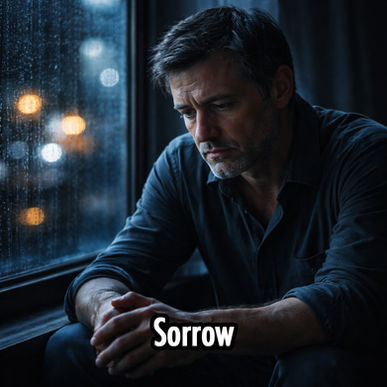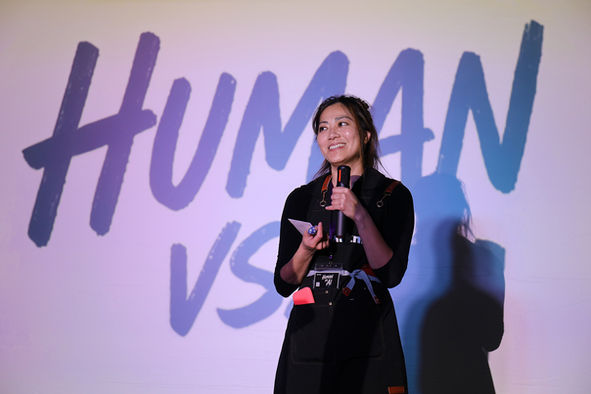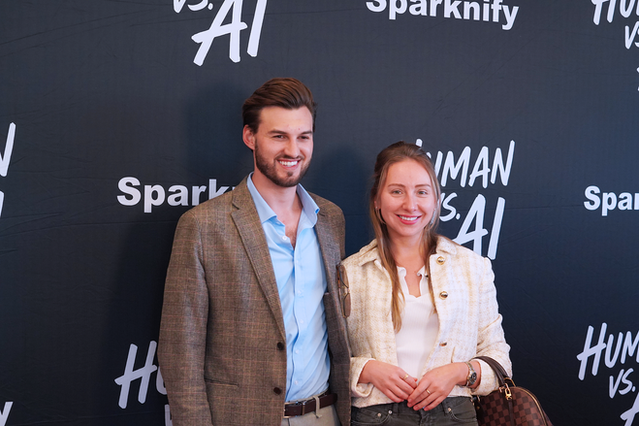

In 1896, the Lumière brothers premiered the first publicly screened film in Paris, Arrival of a Train at La Ciotat (French: L’Arrivée d’un train en gare de La Ciotat), which is considered the beginning of cinematic history. At the time, audiences were startled by the large image of the train approaching on the screen that they thought it would break through the screen and crash into them. People were captivated by the images on the screen, overwhelmed by the impact they conveyed.
A century later, the emergence of AI technology has rewritten the rules of narrative and filming, which are no longer solely the domain of humans. The continuous imagery generated by AI brings a level of impact comparable to the shock experienced by audiences a hundred years ago, challenging human imagination and consciousness. The question arises: are humans and AI in competition or can they collaborate? The possibility of AI achieving consciousness seems imminent, raising the question of whether humanity is exclusively defined by its unique traits. As humanity stands at the singularity of an AI-driven paradigm shift, entering a new epoch, how can humans preserve their humanity? And how will AI achieve the qualities of humanity?
The overarching theme is Humans vs. AI: Can AI truly replace humans, and what path will humanity take? “Who am I? Where do I come from? Where am I going?” These fundamental questions may no longer belong solely to humans but perhaps also to AI.
Chanel Chan
Festival Director

About this Film Festival
The Sparknify Human vs. AI Film Festival is a global film festival exploring a defining question of our time: Can machines meaningfully express human emotion, and what does that reveal about humanity?
Bringing traditional filmmakers and generative AI creators onto the same stage, the festival reframes cinematic evaluation around Emotion, not genre. Each film centers on one of seven core human emotions: Joy, Rage, Sorrow, Contentment, Love, Aversion, or Desire, asking creators to define their work by how it makes audiences feel.
More than a competition, the festival serves as both a Turing Test for AI films and a creative compass for filmmakers, examining how emotion is evoked in cinema in the age of intelligent machines.
Selected works are reviewed by leading voices across cinema, AI, and human perception, and showcased at a live premiere event in Silicon Valley with screenings and discussions on the future of storytelling.
Category
Human or AI?
Choose to submit either a human-produced or an AI-generated short film, while following the respective rules below:

Human-Produced Short Films
As AI reshapes film production, it brings existential challenges to both the industry and humanity. More than ever, it is crucial to celebrate the unique storytelling and creativity that define us as humans. We seek visionary creators dedicated to safeguarding humanity for a flourishing future.
Length:
1 to 30 minutes (including credits)
Equipment and Tools:
Use conventional video cameras and lighting equipment for filming, with computer editing software permitted for post-production. All narrations and dialogue must be authentic recordings of human voices. The use of AI-generative tools at any stage of production is strictly prohibited and will result in disqualification. While the use of images or video from CAD or 3D modeling software is allowed, it is strongly discouraged.

AI-Generated Short Films
AI-generated films showcase the innovation of AI technology, transforming storytelling and reshaping creativity. We celebrate this progress and seek visionary creators who excel in using these tools to craft narratives that not only pass the Turing Test but to capture the essence of humanity.
Length:
1 to 30 minutes (including credits)
Equipment and Tools:
The entire film must be created using AI-generative tools. Computer editing software is allowed for post-production. Narrations and dialogue preferred to be AI-generated from scripts generated by AI. The use of images or videos from CAD or 3D modeling software is generally not considered to be AI generated. Most of visual and audio elements must align with the film’s AI-generated origin, ensuring the work remains a true showcase of AI capabilities.
Emotion
Core Response?
Choose one of the seven emotions below that best reflects the dominant response your film evokes in its audience:
This festival categorizes films by emotion rather than genre. We believe the true power of cinema lies in its ability to shape how audiences feel. By focusing on emotional influence, the festival examines how directors, human or AI, use storytelling, craft, and technique to guide human response. At the heart of this exploration is a central question: can machines evoke human emotion as deeply as people can? Through seven emotions that define humanity, we seek films that most powerfully capture the emotional core of cinema.







7 Emotions
Joy
Joy is defined by the emotional uplift a film creates in its audience. Films in this category succeed not because joy is shown on screen, but because it is felt by viewers through timing, tone, performance, and release. These works demonstrate how cinema can generate happiness, warmth, and optimism as an emotional outcome.
Rage
Rage reflects a film’s ability to provoke anger, tension, outrage, or emotional intensity in its audience. Films in this category are marked by their capacity to awaken frustration, resistance, or moral urgency in viewers. These works examine how directors channel conflict and pressure to produce a visceral emotional response.
Sorrow
Sorrow is defined by the weight a film places on its audience. Rather than depicting sadness alone, these films draw viewers into a shared experience of loss, reflection, or emotional heaviness. They reveal how cinema can slow time, deepen empathy, and allow grief to be felt rather than observed.
Contentment
Contentment reflects a film’s ability to leave audiences in a state of calm, balance, or quiet satisfaction. These films do not rely on dramatic peaks, but instead guide viewers toward emotional ease and presence. They demonstrate how subtle pacing, atmosphere, and restraint can produce lasting emotional harmony.
Love
Love is defined by how strongly a film fosters feelings of connection, closeness, or care within its audience. Whether romantic, familial, or communal, these films succeed when viewers feel intimacy rather than simply witness it. They explore how cinema can generate emotional bonds through shared vulnerability and human presence.
Aversion
Aversion represents a film’s ability to unsettle or disturb its audience. Films in this category provoke discomfort, unease, or emotional resistance, drawing viewers into fear, tension, or moral instability. These works test how precisely a director can control atmosphere to sustain emotional unease.
Desire
Desire reflects the emotional pull a film creates within its audience, a sense of wanting, yearning, or unresolved tension. These films hold viewers in a state of anticipation or aspiration, often without resolution. They explore how cinema can sustain emotional momentum by keeping audiences emotionally invested in what remains out of reach.
Awards

Sparknify Humanity Award
US $3000
The Sparknify Humanity Award honors the film that most powerfully evokes a defining human response. Selected from the seven emotion-category winners, this top award recognizes the work that demonstrates the highest mastery in shaping how audiences feel. Whether created by a human filmmaker or generated by artificial intelligence, the winning film distinguishes itself through its ability to influence emotion with depth, subtlety, and intention. As AI increasingly participates in cinematic creation, this award asks a central question: can machines guide human emotion as meaningfully as people can? The Sparknify Humanity Award does not favor origin, but outcome, celebrating exceptional emotional control, precision of craft, and an understanding of the emotions that define humanity.

Joy Emotion Award

Sorrow Emotion Award

Love Emotion Award

Desire Emotion Award

Rage Emotion Award

Contentment Emotion Award

Aversion Emotion Award

2026 Sparknify Human vs. AI Film Premiere & Fair
The nominated films will premiere on September 26, 2026 in San Francisco, alongside panel discussions on the future of cinematography and product presentations from cutting edge tech startups, with food vendors and purveyors of unique products creating a festive atmosphere, culminating in the awards ceremony honoring the 2026 Sparknify Humanity Award and the emotion category winners. Premiere tickets will be available in March. Join our mailing list to be notified about ticket releases, the film premiere, and other upcoming Sparknify events.
Partner With the Future of Cinema
The Human vs. AI Film Festival is more than a screening but a live exploration of how emotion, intelligence, and creativity intersect. We invite forward-thinking brands, studios, research labs, and technology companies to join us as sponsors and partners in shaping this conversation. Sponsorships provide curated exposure, experiential activation opportunities, and direct connection with creators and thought leaders defining the next era of film.
2025
Sparknify Humanity Award: L’Acquario (The Aquarium) by Gianluca Zonta of Italy Vincenzo is on his first date with Sara, he asks for help from an application based on AI, which suggests what to say. A love story is born and they organize a blind date for their best friends, advising them both to use AI. About the Sparknify Humanity Award Cash Prize: US$3000 Honors the film — whether traditionally shot by humans or creatively generated by AI — that most profoundly captures the essence of humanity. As artificial intelligence transforms film production, it presents significant existential challenges to both filmmakers and society, prompting us to reconsider what truly defines our human experience. This award embodies the spirit of highlighting and protecting the uniquely human qualities in storytelling, urging traditional filmmakers to embrace narratives only humans can create. Simultaneously, it celebrates AI generated films as powerful demonstrations of technological innovation, creativity, and imagination. We honor visionary creators on both sides: filmmakers committed to expressing authentic human narratives, and AI artists striving to surpass the Turing Test by exploring human truths. Ultimately, the Sparknify Humanity Award inspires all creators — human or machine — to learn, observe, and deepen their understanding of what humanity truly means in the age of AI.
Best AI Generated Award: The Monkey With Its Tongue Out by Sebastian Arriagada of Chile A filmmaker’s encounter with a spider monkey sparks reflections on who truly controls whom in the age of data. Blending real and AI-generated images, the film blurs the line between the biological and digital. Set against echoes of Chile’s dictatorship and a poet’s cage performance, it asks: when algorithms study us, what will we reveal? About the Best AI Generated Award Honors generative AI filmmakers who demonstrate exceptional skill and creativity in harnessing AI technologies. This award is presented to the creator whose film showcases the highest level of technical excellence, effectively pushing the boundaries of what AI can achieve in filmmaking. The winning film stands apart by captivating audiences through a memorable narrative, visuals, or artistic style, clearly demonstrating AI’s remarkable capabilities and potential to revolutionize cinematic storytelling. Vincenzo is on his first date with Sara, he asks for help from an application based on AI, which suggests what to say. A love story is born and they organize a blind date for their best friends, advising them both to use AI.
Best Picture Award: Movimentos Migratórios (Migratory Movements) by Rogério Cathalá of Brazil Pedro Paniagua recently migrated to Brazil and faces a daily challenge for survival. He plans to bring his family when he adapts to the new country. When a swallow falls into his house, he finds himself torn between the routine of searching for a job and trying to save the bird. Every place he goes, he encounters difficulties that reflect his own status as an immigrant. Pedro persists in his promise to save the bird as a mission that proves transformative. About Best Picture Award Best Picture Award honors filmmakers who excel in using traditional filmmaking methods and equipment to produce a film of outstanding quality. This prestigious award celebrates the highest achievements in storytelling, visual effects, cinematography, setting, and overall artistic vision. The winning film captivates audiences through compelling narratives, immersive scenery, remarkable performances, and seamless integration of visual and sound elements. Each nominated film embodies the craftsmanship, creativity, and attention to detail that define truly exceptional cinema.

The Writer’s Horror
By Sergiy Pudich
Ukraine/Tailand
Pi in the Sky
By Petra Molnar
United Kingdom
Migratory Movements
Rogério Cathalá
Brazil
The Monkey With Its Tongue Out
Sebastian Arriagada
Chile
Endling
Endre Andor Lengyel
Hungary
The Living Room
Mariam Mouzoul
Morocco
Silentium
Roméo Lefèvre
French
The Aquarium
Gianluca Zonta
Italian
Partner
Johnny Su
Taiwan
Heal
Manuel Larios
Peru
#Beachfile
Carles Bigorra
Spain
Dark, Light, Yellow
Fran Gas
Spain
AI Love You, AI Don't Love You
Akari Sōma
Japan
Meet me in Chinatown
Jerry Hsiao & Anna Sophie Loewenberg
USA
The Sparknify Film Committee nominated the above films from submissions received around the world. Each submission was first evaluated based on basic qualification criteria, such as meeting the required length, resolution standards, and applying fundamental techniques in either traditional filmmaking or AI generation. Films were also assessed for their basic quality, narrative clarity, and aesthetic merit. After this initial screening, selections were balanced across a range of factors, including genre, country of origin, and thematic diversity, to ensure a rich and representative showcase for the 2025 Human vs. AI Film Festival.
Judges
The 2025 judging panel was composed of an international consortium of key figures from academia and the film industry, bringing together diverse perspectives at the intersection of technology and storytelling.

Pixar
Aaron Lo
Technical Director

408 Films
Brian Yang
Film and TV producer

Dariush Derakhshani
VFX & Animation Supervisor & Producer

UC Santa Cruz
Joseph Erb
Associate Professor of Film & Digital Media

University of Colorado Boulder
Larissa Schwartz
Professor of Generative AI

MFSA Studios
Lynn Peng
Screen writer & Independant producer

Vanessa Born
Actress, Producer, and Writer

UC Berkeley
Anton Kaes
Professor of Film & Media

The Asian Art Museum
Cheng Xu
Assistant Curator

Boston College
Gautam Chopra
Faculty in Art, Art History, and Film

Cinespot
Kenji Lui
Chief Editor

The VOICE Creative
Lingo Hsieh
Director and Screenwriter

De Anza College
Rachel Silveria
Professor in the Film & Television

California Institute of the Arts
Yaloo Lim
Faculty in Experimental Animation

San Francisco State University
Bill Nichols
Professor Emeritus of Cinema

Plus One Studio
Dan Chi Huang
Director, Producer, and Writer

Stanford
Jan Krawitz
Professor Emerita of Documentary Film

Lana Shapoval
Filmmaker

CinemaAnyways
Luke Shen
Producer, Director, and Columnist

San Francisco State University
Rosa Park
Associate Professor of Cinema












































